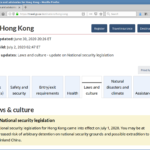This week I sent the following email to my Member of Parliament (MP, Kenny Chiu) and my Member of the Legislative Assembly (MLA, Kelly Greene), copied to the Prime Minister of Canada and the Premier of British Columbia. I’m not expecting a substantive — or any! — reply from any of them, to be frank. However, if I do I’ll update this post or make a new one.
From: Craig Hartnett
To: kenny.chiu_AT_parl.gc.ca, kelly.greene.mla_AT_leg.bc.ca
CC: pm_AT_pm.gc.ca, premier_AT_gov.bc.ca, letters_AT_nationalpost.com, sunletters_AT_vancouversun.com
Subject: Reasoning for slow roll-out of COVID-19 vaccine in Canada
Date: Thu, 14 Jan 2021 21:09:28 -0800Dear Mr. Chiu and Ms. Greene,
I write to both of you with respect to the roll-out of the COVID-19 vaccine in Canada. From my point of view, it seems that (currently) acquisition is a Federal responsibility, and administration and deployment a Provincial one. Feel free to correct me if I’m wrong, but I believe my concern should be addressed to both levels of government.
Like the vast majority of Canadians, I (and to the best of my knowledge, my family and friends, to whom this email is blind-copied) have been following provincial health guidelines. I and we are not heroes for doing this, but we have trusted our health officials and interrupted our lives accordingly.
It is not a surprise to me that life did not “go back to normal” a week after the first vaccine was approved. I’m not that stupid. However, it shocks me to hear that India plans to vaccinate 300 million of its citizens by July, while Canada’s lofty goal is to vaccinate an eighth as many people (38 million) by September. (I do note that 300 million people is only about 22% of its population; I also note that both figures are just projections.) Israel — a much smaller country I do admit without the geographical and meteorological challenges of Canada — has already vaccinated one million people, about 11% of its population. (These Israeli numbers are already out of date; they have now vaccinated 25% of their population, over two million people!)
I’m not engaging in “vaccine nationalism” here, but these figures tell me that there is absolutely no sense of urgency on the part of Canadian governments to vaccinate our populace. On newscasts, doctors and other medical officials have told us that vaccination is a complicated, multi-step and time-consuming process, but if the danger was more clear and present, I suspect those bureaucratic obstacles could be cleared in short order.
If we can mount Federal elections across this vast country in a span of twelve hours, why the hell can’t we mount the same effort — with volunteers also carrying out complicated, multi-step tasks and record-keeping — to get our population vaccinated sooner? I’m not suggesting we can vaccinate the entire country in one day, and I realise that we have to wait our turn for supplies of vaccines, but the September time line seem utterly and ridiculously low, especially when compared with India’s goals.
What’s more important? Vaccinations, fewer deaths and a recovering economy, or paperwork and record-keeping?
Canadians are tired, and it shows in the numbers. We’re also tired of politicians over-promising and under-delivering. According to the CBC, Maj.-Gen. Dany Fortin has “conceded Canada’s vaccine supply will be rather ‘limited’ for the first three months of this year ….” This goes against all of the talk of prominent politicians, not the least of which is Prime Minister Justin Trudeau! Sure, Mr. Trudeau has promised we’ll all be vaccinated by the end of September, but as shown above, two months before that date India will have vaccinated eight Canadas!
Canada needs more imagination and determination than we are currently showing. At the very least, the country should consider employing the military in the process, but there are other ideas out there too.
I believe that Canada needs to work overtime to pick up the pace. What are you doing to impress upon our Prime Minister and Premier that they’re not doing enough?
Yours sincerely,
Craig Hartnett
Richmond BC
Cc:
- Prime Minister of Canada, The Right Honourable Justin Trudeau
- Premier of British Columbia, The Honourable John Horgan
- National Post, Editor
- Vancouver Sun, Editor
Bcc:
- Family and friends
Following this, I received this email from one of my correspondents:
The story all along has been that everyone would be vaccinated by September. Given that the approved vaccines require two doses one would infer that ‘vaccinated’ meant that everyone would have received two shots. Story has changed today — now it is that everyone will have received one shot by September. This country is run by a bunch of fucking retards. They turned down extra Moderna doses and that option has now gone and ordered more Pfizer doses. Well, we know where that went today. So Trudeau kept on about how many millions of doses they had contracts for but they don’t seem to be worth the paper they’re written on because fuck all is showing up. We are behind Slovenia for god’s sake (maybe that has something to do with Melania).
As for the twits who, with no medical background, keep on about extending the time between shots — they should all be fired and people with brains put in as replacements.
My reply:
I mocked Michelle Rempel — Conservative, attention-loving, blonde MP from Alberta — when she called Trudeau et al. “incompetent”, despite the fact that it was the Conservatives who let vaccine manufacturers close up shop here years ago, but maybe she was right!
I was blown away when Hillier speculated about extending the time between shots, and I told […] he sounded like trump! And then, to my surprise, “experts” all over government were agreeing with him! It’s a bloody joke!
Trudeau keeps going on about meeting the September promise, with no mention of how pathetic that goal is!











